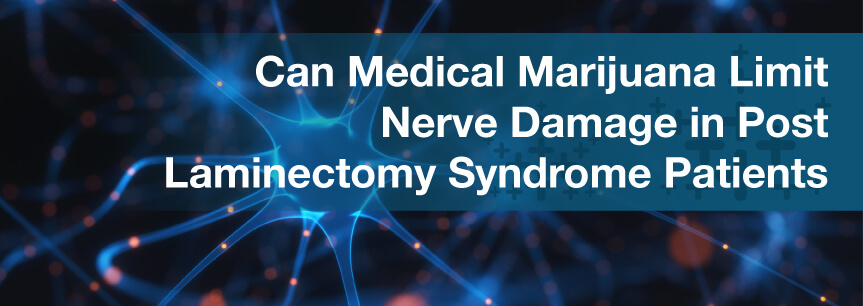
A laminectomy is a surgery that’s performed on the spine when a patient exhibits chronic pain. Though this procedure is used to help patients living in discomfort, the opposite can also occur. Post laminectomy syndrome (PLS) is a potential complication that can arise after this type of operation.
When nerve damage occurs due to a laminectomy, the chronic pain that develops after the procedure is known as PLS. Nerves are extremely sensitive and slow to heal. If a patient has PLS, the only treatment option doctors currently can offer is pain medication to give them relief as the nerves heal on their own.
But, there is evidence that another solution could exist. Medical marijuana may be able to limit the nerve damage that occurs after a laminectomy, thus alleviating or preventing PLS. In the United States, cannabis is on the government’s list of Schedule I drugs, which restricts what we know about its medical potential. However, as more evidence arises, we may see new cannabis-based medications for PLS patients in the not-so-distant future.
The reason a laminectomy is attempted in the first place is due to chronic nerve pain. Sometimes, if the spinal cord is compressed, it will cause shooting or burning pain to develop in a patient’s back. To provide more space for the spinal cord within the narrow passage of the spinal column, a surgeon will remove the lamina, which is the protective covering of the spinal cord.
Unfortunately, this can lead to PLS, which is caused by nerve damage. Several things can contribute to the development of PLS:
With the removal of the lamina, proper circulation is restored to damaged nerves. The goal is to provide optimal conditions for healing as the nerves get the nutrients they need. Unfortunately, this takes an indefinite amount of time, and patients must deal with pain until then.
The spinal cord is made up of some of the body’s most delicate tissue. When it undergoes trauma, either from compression, laceration or other complications, the initial damage isn’t the only concern. After any type of spinal cord damage, secondary injury can occur within minutes or days.
After the initial injury, the spinal cord is at risk. Complications can arise that cause a cascade of adverse effects on a cellular level. This increases the damage to the delicate tissue with far-reaching consequences. In fact, some doctors believe secondary injuries can be even more harmful to the patient than the initial trauma.
Secondary injuries to the spinal cord are caused by the release of concentrated levels of naturally occurring chemicals in the body. In small doses, these chemicals are absorbed normally. However, large concentrations make them toxic. This leads to:
Marijuana has protective properties that may be able to prevent further spinal cord damage. If taken within a few minutes after the injury occurs, it can limit the nerve damage caused by secondary injuries.
The cannabinoids found in marijuana have a profound effect on our endocannabinoid system (ECS), which is made up of receptors found throughout our body. The compounds in cannabis bind to these receptors, giving the plant its medicinal properties.
One such quality is marijuana’s ability to suppress the release of the toxic chemicals that cause secondary injuries. It also relieves inflammation and swelling, which can further compress the spinal cord if not controlled. This means medical marijuana can:
If you believe marijuana treatments are the right option for you or a loved one with PLS, contact a marijuana doctor in your state. Our advice is a resource at your disposal, but all medical decisions should be made with the help of a qualified medical professional. Or, contact a local dispensary — the friendly budtenders will be able to answer any cannabis-related questions you may have.